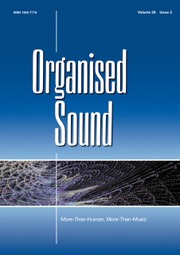Article contents
L’Objet Sonore Maintenant: Pierre Schaeffer, sound objects and the phenomenological reduction*
Published online by Cambridge University Press: 05 April 2007
Abstract
The work of Pierre Schaeffer (theorist, composer and inventor of musique concrète) bears a complex relationship to the philosophical school of phenomenology. Although often seen as working at the periphery of this movement, this paper argues that Schaeffer's effort to ground musical works in a ‘hybrid discipline’ is quite orthodox, modelled upon Husserl's foundational critique of both ‘realism’ and ‘psychologism’. As part of this orthodoxy, Schaeffer develops his notion of the ‘sound object’ along essentialist (eidetic) lines. This has two consequences: first, an emphasis is placed on ‘reduced listening’ over indicative and communicative modes of listening; secondly, the ‘sound object’ promotes an ahistorical ontology of musical material and technology. Despite frequent references to Schaeffer and the ‘sound object’ in recent literature on networked music, concatenative synthesis and high-level music descriptors, the original phenomenological context in which Schaeffer's work developed is rarely revisited. By critically exploring Schaeffer's theorising of the ‘sound object’, this paper aims at articulating the distance between contemporary and historical usage of the term.
Information
- Type
- Research Article
- Information
- Copyright
- Copyright © Cambridge University Press 2007
References
* A special acknowledgement must be made to the anonymous reviewers at Organised Sound for their thorough knowledge of the writings of Pierre Schaeffer, in addition to invaluable help with editing and translation. Unless cited otherwise, all translations from the French are mine.
- 56
- Cited by

